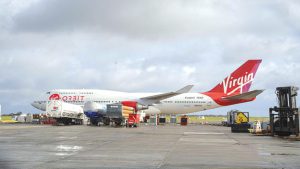BLOOMBERG
Virgin Orbit Holdings Inc filed for bankruptcy after the satellite launch firm tied to British billionaire Richard Branson failed to secure the funding needed to keep operating and cut about 85% of its staff.
The company listed $243 million in assets and $153.5 million for its total debt in a Chapter 11 petition filed in Delaware.
The move punctuates the rapid fall of the Long Beach, California-based company, after a high-profile launch failure in January and collapse in its stock price. Virgin Orbit halted operations in March while it sought additional capital, and later laid off about 671 employees.
Branson’s Virgin Investments Ltd has committed to providing an added $31.6 million to keep the pared-back operation going while it seeks a buyer. The 72-year-old billionaire had already pumped in $70.9 million since November, according to bankruptcy filings.
CEO Dan Hart said he’s seeking a transaction that will position Virgin Orbit and its assets “for future opportunities and missions,†according to a statement. The firm — part of Branson’s empire that includes Virgin Atlantic Airways Ltd and spaceflight company Virgin Galactic Holdings Inc — hasn’t turned a profit as a public company. It lost about $191.2 million last year, Virgin Orbit said in a regulatory filing.
The launch company officially began in 2017 as an offshoot of Virgin Galactic. Virgin Orbit’s business centered on launching small satellites into orbit.
Unlike some competitors that launch rockets from the ground, Virgin Orbit uses a technique known as air launch, in which its LauncherOne rocket is deployed at a high altitude from underneath the wing of a modified Boeing Co 747 plane. The company began developing the rocket at Virgin Galactic, years before the satellite-launch business was formally created.
Virgin Orbit successfully launched its first mission to orbit in January 2021 and completed four successful flights through 2022. It has placed 33 satellites into precise orbit, the company said.
The company had planned to increase its launch frequency this year but had to reassess after the failed January mission, which was slated to be the first orbital launch from British soil. Its vehicle never reached orbit after incurring a problem with a fuel filter during the flight, leading to the loss of nine small satellites.
The mishap accelerated a cash crunch under way since the Spac transaction that took Virgin Orbit public in December 2021. That deal netted just $67.8 million for the company, significantly less than expected, CEO Hart said in a court filing.
Virgin Orbit began working with Goldman Sachs & Co and BofA Securities Inc in early 2022 — soon after it went public — to pursue a sale or raise more capital, according to Hart.
Higher interest rates and changes in capital markets contributed to Virgin Orbit’s failure to raise enough money, Hart said.
 The Gulf Time Newspaper One of the finest business newspapers in the UAE brought to you by our professional writers and editors.
The Gulf Time Newspaper One of the finest business newspapers in the UAE brought to you by our professional writers and editors.
